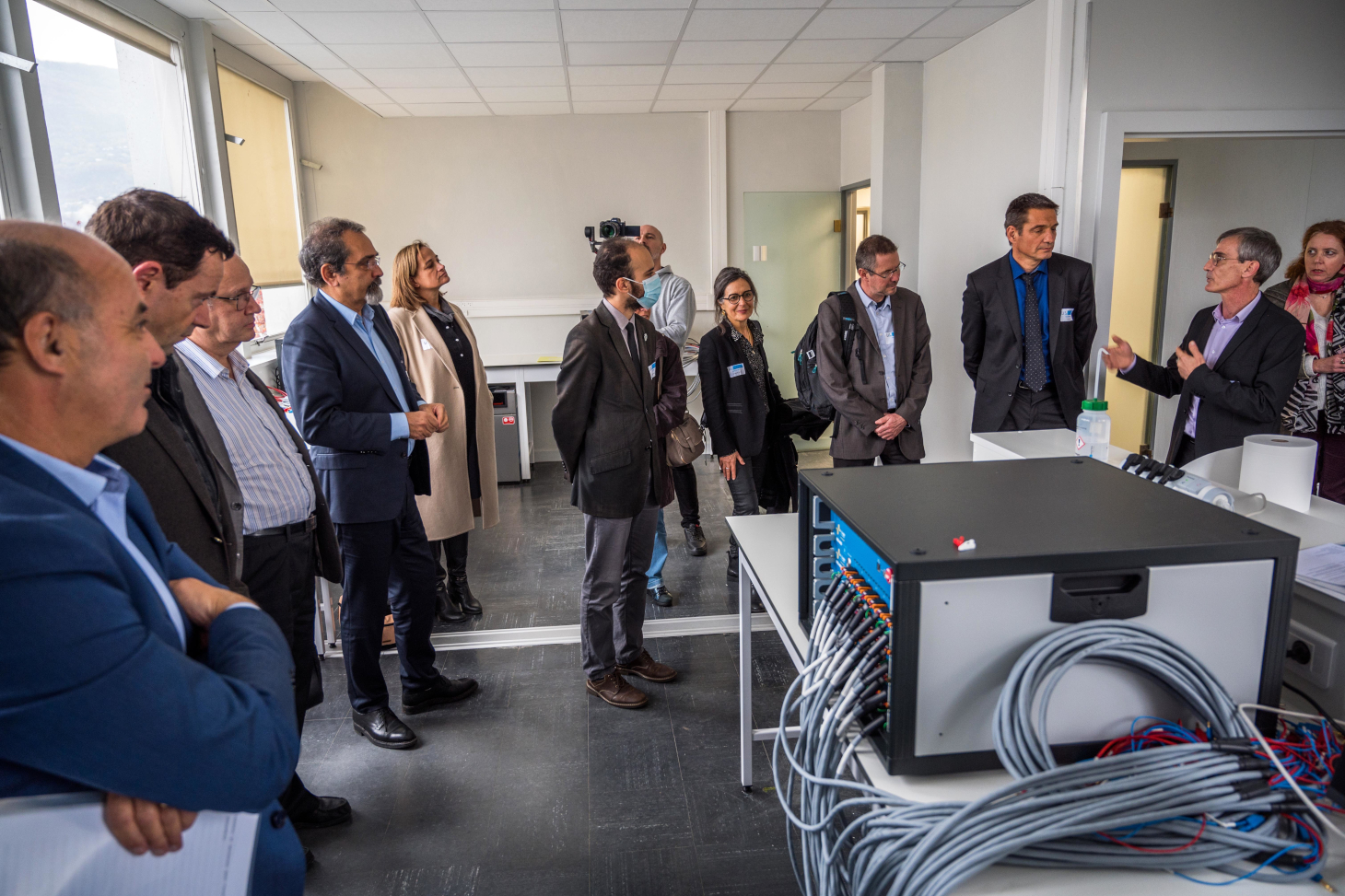LEPMI and Blue Solutions join forces to invent the batteries of the future
Innovation, Research, The university in general
On November 24, 2022

On Wednesday, 23 November, 2022, the Laboratory of Electrochemistry and Physical Chemistry of Materials and Interfaces (LEPMI*) and the company Blue Solutions inaugurated a new joint laboratory, Li² (Lab Lithium & Interface) on the Saint-Martin-d'Hères campus of the Université Grenoble Alpes (UGA). The aim is to create the first new-generation all-solid lithium metal battery.
The inauguration of this new joint Li² laboratory, which brings together Blue Solutions employees and LEPMI scientists on the same premises, perpetuates a collaboration that has already been ongoing for 20 years between these two expert teams in the field of batteries.
The objective of the partnership and of this joint laboratory is to develop the first all-solid lithium metal battery of the new GEN 4 generation, which will increase the autonomy and safety of batteries.
In addition, with lithium-ion batteries, the ionic conductor between the two electrodes is a liquid organic solvent, which can ignite when the temperature rises. This risk is avoided thanks to solid electrolytes (composites, polymers, ceramics...), which, in addition to giving greater security, make it possible to do without the heavy, expensive and insufficient thermal regulation systems integrated into cars.
At Li², researchers will study the electrochemical behavior of lithium metal, in order to better understand it and to remove the last scientific obstacles to make its use even more efficient.
By 2035, thermal vehicles will be replaced by electric vehicles; the battery market is therefore growing exponentially. Researchers around the world are currently working on the next generation of batteries, because lithium-ion, the leading technology, has reached its limits.
Renaud Bouchet, a professor at Grenoble INP - UGA and co-director of Li², said: "The collaboration between LEPMI and Blue Solutions, through numerous projects, has enabled us to capitalize on a unique knowledge of tomorrow's technological building blocks. The close link between industrial resources and academic methods is the key to shortening the time to application of the major discoveries that will be made in the coming years."
Since its creation in 1995, LEPMI has been conducting research on the design, synthesis, elaboration and shaping of materials dedicated to electrochemical energy storage and conversion systems: batteries, super-capacitors, fuel cells, electrolyzers, photovoltaics.
Blue Solutions, a French company and subsidiary of the Bolloré Group, is a pioneer in all-solid state batteries. The company has more than 20 years of experience in the research and development of solid state Lithium Metal Polymer battery technology. As such, the company can boast of many world firsts.
The objective of the partnership and of this joint laboratory is to develop the first all-solid lithium metal battery of the new GEN 4 generation, which will increase the autonomy and safety of batteries.
Lithium metal: increasing battery life and safety
Lithium-ion, which is mainly used for electric batteries, sets limits on the amount of energy that can be carried per unit of weight or volume. This has a direct impact on the autonomy of vehicles. Using lithium metal as in Blue Solutions' batteries increases energy density and range, among other benefits.In addition, with lithium-ion batteries, the ionic conductor between the two electrodes is a liquid organic solvent, which can ignite when the temperature rises. This risk is avoided thanks to solid electrolytes (composites, polymers, ceramics...), which, in addition to giving greater security, make it possible to do without the heavy, expensive and insufficient thermal regulation systems integrated into cars.
At Li², researchers will study the electrochemical behavior of lithium metal, in order to better understand it and to remove the last scientific obstacles to make its use even more efficient.
By 2035, thermal vehicles will be replaced by electric vehicles; the battery market is therefore growing exponentially. Researchers around the world are currently working on the next generation of batteries, because lithium-ion, the leading technology, has reached its limits.
Two battery experts team up
According to Richard Bouveret, President of Blue Solutions: "The partnership with LEPMI allows us to continue a scientific collaboration that has lasted for more than 10 years. The objective is to accelerate research and remove the last scientific barriers in order to bring an ultra-efficient all-solid battery to market by 2028. We are aiming for a technology with 50% more energy density than today's Li-ion batteries, greater safety and a better environmental record because it uses fewer metals and is more recyclable."Renaud Bouchet, a professor at Grenoble INP - UGA and co-director of Li², said: "The collaboration between LEPMI and Blue Solutions, through numerous projects, has enabled us to capitalize on a unique knowledge of tomorrow's technological building blocks. The close link between industrial resources and academic methods is the key to shortening the time to application of the major discoveries that will be made in the coming years."
Since its creation in 1995, LEPMI has been conducting research on the design, synthesis, elaboration and shaping of materials dedicated to electrochemical energy storage and conversion systems: batteries, super-capacitors, fuel cells, electrolyzers, photovoltaics.
Blue Solutions, a French company and subsidiary of the Bolloré Group, is a pioneer in all-solid state batteries. The company has more than 20 years of experience in the research and development of solid state Lithium Metal Polymer battery technology. As such, the company can boast of many world firsts.
* Electrochemistry and Physicochemistry of Materials and Interfaces Laboratory: CNRS, Grenoble INP - UGA, UGA, USMB
Published on December 1, 2022
Updated on December 1, 2022
Updated on December 1, 2022

